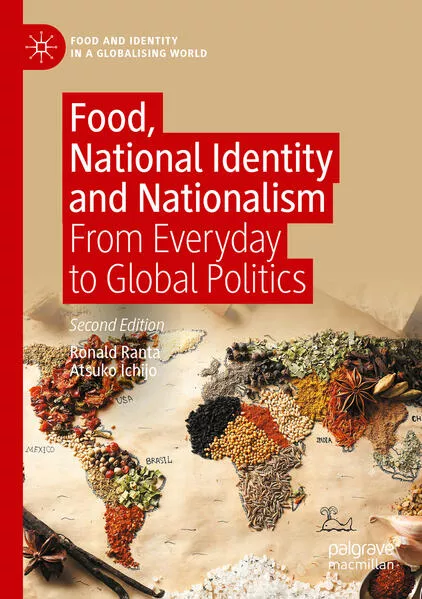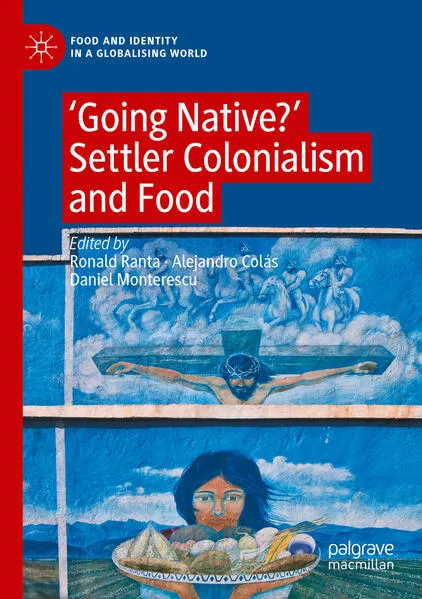
- Publikationen ca: 6
- Fragen & Antworten
Ronald Ranta
Ronald Ranta is Senior Lecturer in Politics and International Relations at the Kingston University London, UK. As a former chef, he has written extensively on the subject of food and identity, particularly national identity.
Alejandro Colás is Professor of International Relations at Birkbeck, University of London, UK.
Daniel Monterescu is Associate Professor of Urban Anthropology and Food Studies at Central European University, Vienna, Austria.
Food, National Identity and Nationalism
Building and expanding on the first edition, the second edition of Food, National Identity and Nationalism continues to explore a much-neglected area study: the relationship between food and nationalism. With a preface written by Michaela DeSoucey and using a wide range of case studies, it demonstrates that food and nationalism is an important area to study, and that the food-nationalism axis provides a useful prism through which to explore and analyse the world around us, from the everyday to the global, and the ways in which it affects us.
‘Going Native?'
This volume offers a comparative survey of diverse settler colonial experiences in relation to food, food culture and foodways - how the latter are constructed, maintained, revolutionised and, in some cases, dissolved. What do settler colonial foodways and food cultures look like? Are they based on an imagined colonial heritage, do they embrace indigenous repertoires or invent new hybridised foodscapes? What are the socio-economic and political dynamics of these cultural transformations? In particular, this volume focuses on three key issues: the evolution of settler colonial identities and states; their relations vis-à-vis indigenous populations; and settlers’ self-indigenisation – the process through which settlers transform themselves into the native population, at least in their own eyes.
Food, National Identity and Nationalism
Building and expanding on the first edition, the second edition of Food, National Identity and Nationalism continues to explore a much-neglected area study: the relationship between food and nationalism. With a preface written by Michaela DeSoucey and using a wide range of case studies, it demonstrates that food and nationalism is an important area to study, and that the food-nationalism axis provides a useful prism through which to explore and analyse the world around us, from the everyday to the global, and the ways in which it affects us.
Food, National Identity and Nationalism
Building and expanding on the first edition, the second edition of Food, National Identity and Nationalism continues to explore a much-neglected area study: the relationship between food and nationalism. With a preface written by Michaela DeSoucey and using a wide range of case studies, it demonstrates that food and nationalism is an important area to study, and that the food-nationalism axis provides a useful prism through which to explore and analyse the world around us, from the everyday to the global, and the ways in which it affects us.
‘Going Native?'
This volume offers a comparative survey of diverse settler colonial experiences in relation to food, food culture and foodways - how the latter are constructed, maintained, revolutionised and, in some cases, dissolved. What do settler colonial foodways and food cultures look like? Are they based on an imagined colonial heritage, do they embrace indigenous repertoires or invent new hybridised foodscapes? What are the socio-economic and political dynamics of these cultural transformations? In particular, this volume focuses on three key issues: the evolution of settler colonial identities and states; their relations vis-à-vis indigenous populations; and settlers’ self-indigenisation – the process through which settlers transform themselves into the native population, at least in their own eyes.
‘Going Native?'
This volume offers a comparative survey of diverse settler colonial experiences in relation to food, food culture and foodways - how the latter are constructed, maintained, revolutionised and, in some cases, dissolved. What do settler colonial foodways and food cultures look like? Are they based on an imagined colonial heritage, do they embrace indigenous repertoires or invent new hybridised foodscapes? What are the socio-economic and political dynamics of these cultural transformations? In particular, this volume focuses on three key issues: the evolution of settler colonial identities and states; their relations vis-à-vis indigenous populations; and settlers’ self-indigenisation – the process through which settlers transform themselves into the native population, at least in their own eyes.





